| |
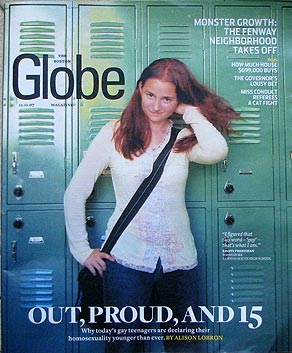 Cover of Boston Globe Sunday Magazine, November 11, 2007.
The Massachusetts nightmare:
Boston Globe celebrates homosexual school clubs persuading kids to "come out" as teenagers (and earlier).
Cover story of the November 11, 2007 Boston Globe Sunday Magazine. Article by lesbian activist teacher also chronicles history of homosexual activism in Massachusetts schools. Describes role of hardcore adult activists and dangerous outside groups targeting children (using taxpayer money). How they use lies, phony statistics, and lobbying pressure to get into the schools -- and the psychological games they use to prey on vulnerable children. Plus, the sappy liberal parents who buy into it.
Adult "gay club" advisor tells how he counsels kids to "come out" and helps them "meet boys". And much more.
This is what we've been saying for years. An unbelievable celebration of homosexual recruitment in the public schools. This demonstrates the obsession the homosexual movement has for children. (And yet another reason NOT to buy the Boston Globe.)
[Article & photos below from Boston Sunday Globe Magazine, Nov. 11, 2007.]
Our comments:
This is what your public schools are doing to children, using your tax money.
|
Easy Out
Ok, maybe not easy. But today's gay high schoolers are discovering that declaring their homosexuality - and doing it at younger and younger ages - brings little of the stigma and complications that earlier generations faced.
By Alison Lobron | Boston Globe Magazine
November 11, 2007
RUSSELL PECK CAME OUT OF THE CLOSET BY ACCIDENT. IT HAPPENED at camp the summer after his freshman year at Concord-Carlisle High School: One day Peck heard several female friends giggling over an attractive older boy, and the next thing he knew, he had joined the conversation. "The girls were talking about how cute he was. I said something like 'Yeah, he is so cute,'" Peck remembers. "It just kind of came out, and I was really startled by it." But his friends were neither startled nor uncomfortable. "They didn't miss a beat," says Peck, now 19 and a freshman at New York University. "They totally accepted me."
|
Schools also persuade parents to buy the insane party line to "accept" child's destructive behavior as "normal and healthy." Don't seem concerned about physical, psychological dangers of homosexuality or anal sex for a 15-year-old. Is this where the abortion-is-fine mentality has brought us?
|
Emboldened by his friends' casual reaction, Peck, a slim young man with curly brown hair, told his parents that he was gay. He was only 15. Their response was equally positive and accepting. His mother, Nancy Peck, who lives in Concord, says her only concern was making sure that Russell was "safe, happy, and healthy." Her son shared his news with friends at Concord-Carlisle that fall, joined Spectrum - a school-based discussion club about gay and lesbian issues - and continued, he says, to feel "very comfortable" during his remaining three years of high school.
|
The media propaganda machine has done its job.
|
In the relative ease of his coming out, Russell Peck represents what one educator calls the "next wave" of gay and lesbian teenagers: adolescents who have grown up with openly gay teachers, television characters, neighbors, politicians, and even parents and who take for granted the acceptance that earlier generations struggled to achieve. After all, this year's high school freshmen were in elementary school when gays began to marry in Massachusetts; for them, gay marriage is more status quo than radical. Most of today's high school students weren't even born in 1989, the year the US Department of Health and Human Services reported that gay and lesbian teens were two to three times more likely to attempt suicide than straight teens, sparking a wave of activism that has made many schools more tolerant places - and taught parents how to support gay children.
As a result of these cultural shifts, gay and lesbian teens are acknowledging same-sex attraction at ever-younger ages and questioning the concept of both "coming out" and "the closet." Increasingly, their challenges look less like the public health crisis of the 1980s and more like the ones their straight peers have always faced: How do you know when a boy likes you (versus just liking you)? How do you ask a girl out? And what do you do when your mom hears about your new boyfriend from one of her friends at the supermarket?
TO UNDERSTAND THE EXPERIENCES SOME TEENS have today, you must go back at least as far as 1989, when the startling report on suicide rates was released. Long an invisible population in high schools, gay and lesbian teens were suddenly thrust into the spotlight. Many adults were horrified by students' stories of hostile school climates, isolation, and even parental rejection.
|
In 1995, Kevin Jennings (mentioned below in article) gave a speech to a homosexual group bragging how they had tricked Gov. Weld and the Massachusetts Legislature into funding homosexual programs by "framing the issue" -- claiming that it was all about "safety".
|
William Weld, who became governor in 1991, said at the time that the state needed to address the suicide rate among gay and lesbian youth. "This is not about a different way of life; it is about life itself," he declared in one 1992 speech. Over the objections of some religious groups, school administrators, and parents, Weld established a commission to examine the experiences of gay youth. The commission recommended support groups in schools for gay and lesbian students, training for teachers, and the passage of a bill prohibiting discrimination based on sexual orientation in the public schools. The goal, supporters said, was safety and health: addressing the way students treated one another, not what they thought about one another's sexual preferences. Still, the bill met with considerable opposition, both from those who claimed there were no gay teenagers in their schools and those who saw homosexuality as immoral. Only after high school students staged an intense lobbying effort did the bill become law - on December 10, 1993.
Fourteen years later, support and discussion groups have become commonplace in many Massachusetts high schools, and teachers who worked for the 1993 law believe schools that have them are more welcoming places today. At Concord-Carlisle, math teacher and former Spectrum adviser Peter Atlas says the climate has improved for students like Russell Peck. When the Concord-Carlisle group formed in 1993, 90 percent of students reported hearing anti-gay epithets in the halls every day, says Atlas, and 75 percent believed that any student who was openly gay would be in danger of physical harassment. "Now," Atlas says, "no kid I know who is in the closet or has come out thinks they'll be beat up. They think they might lose friends, and they aren't sure how their parents will handle it, but they aren't worried about getting beat up."
|
Homosexual activist teachers have a huge role in pushing the agenda in the schools.
|
Frank Pantano, who has taught in the Boston public schools for 30 years, describes a similar shift in that school system. "Generalizing to a certain extent, students are much more open and accepting of each other, and of LGBT people," says Pantano, an English teacher at Boston Community Leadership Academy, using the shorthand for lesbian, gay, bisexual, or transgendered individuals.
|
The Gay, Lesbian and Straight Education Network (GLSEN) is among the most dangerous homosexual groups in the nation which target children in the public schools. They're the ones who did the horrific "FistGate" workshop and gave kids "The Little Black Book - Queer in the 21st Century" and much more.
|
But Kevin Jennings, founder of the New York-based Gay, Lesbian and Straight Education Network (and a onetime teacher at Concord Academy), cautions that while life may be better for some teens in some schools, verbal and physical harassment remains a serious problem, especially in the 40 states without laws explicitly prohibiting harassment based on sexual orientation. A 2005 national survey by his group found that nearly one in three LGBT youths skipped school during the previous month because they were too afraid to attend - and that the majority hear anti-gay language on a regular basis. But he believes activism and "the incredible leadership of straight allies like Bill Weld" have changed the landscape for many of the estimated 15,000 gay and lesbian students in Massachusetts public high schools.
|
Pay attention to that quote. What happens here eventually goes across the country.
|
"I think the reason you're seeing that shift in Massachusetts is because there's been a concerted effort to make life better for these young people," says Jennings. "What happens in Massachusetts seems to be what happens in the rest of the country 10 or 15 years later. Hopefully, what you're seeing is the next wave."
|
Activist teachers constantly counsel kids without parents' knowledge. Their stealth approach to trusting adolescents is a deadly way to lead them to the homosexual lifestyle.
|
I GOT MY FIRST INKLING OF THE NEXT WAVE FROM A 15-YEAR-OLD GIRL I'll call Lisa. A student at Concord Academy, where I teach English part time, Lisa dropped by my office several years ago to discuss essay structure and ended up confessing her crush on a female classmate. To my surprise, Lisa wasn't seeking to discuss the gender of her crush and what it might or might not mean about her sexual identity. She didn't seem to think it mattered whether or not she was gay. What she wanted was advice on how to approach the girl: directly or through the tried-and-true teenage method of casually hinting to a friend that she should tell another friend to alert the crush?
My gut response - though I didn't say it - was that she shouldn't approach the girl. I had graduated from Concord-Carlisle High School back in 1992, when 75 percent of kids thought an openly gay student would be beat up. Now, at Concord Academy, I was anxious for Lisa. I didn't expect she'd be physically hurt, but I thought she might regret coming out at such an early age. I thought school might be a lot easier for her if her peers didn't know she was, or might be, a lesbian. I didn't, at the time, understand what it would have cost her not to be open.
A week later, Lisa reported back: The object of her affections had thanked her and said she was flattered but not interested. I was stunned by the other girl's relaxed response. Lisa wasn't.
|
BAGLY is a radical extremist homosexual group which targets the most vulnerable children. It has led kids to counseling on body mutilation in order to "become" the opposite sex. (BAGLY is run by a male-to-female transsexual.)
Here are some pictures from BAGLY's most recent "prom" where transsexual adults are allowed in to mingle with kids.
|
I encountered similar openness (and grappled again with my own generational assumptions) more recently during newcomers' hour at the Boston Alliance for Gay, Lesbian, Bisexual and Transgender Youth. BAGLY - a nonprofit best known for its annual prom - holds weekly meetings and social activities in its Copley Square headquarters, a vast, light-filled space with hardwood floors, a mini-amphitheater, and tall windows overlooking Boylston Street. When I arrived on a hot August night, four or five kids were already joking like old friends while a half-dozen others hovered shyly in the corners. There were perhaps twice as many boys as girls, and while one thin, freckled boy looked young enough to be in middle school, several others swaggered with the sophisticated confidence of college students. The leader, an energetic collegian from Miami, cajoled the group into forming a misshapen circle and asked that we introduce ourselves by sharing our name, age, and favorite color.
When my turn came, I delivered a rather long speech to the effect that I'm a reporter, that I'd be writing about the event and interviewing any willing participants, that I wouldn't use anyone's name without explicit permission. There was a brief silence after I finished. Then the leader grinned and said: "Ah, OK. But all we really need to know is your name, your age, and your favorite color."
I felt my face heat up. Again, I'd assumed gay kids wouldn't want to talk to a reporter - that is, that they would want to hide their presence at BAGLY.
"Alison," I muttered. "Thirty-two. Red."
It's worth noting, of course, that gay and lesbian students who feel insecure in their schools or families might never go anywhere near a place like BAGLY, much less talk to a reporter. So the voices of the teens I met, at BAGLY and elsewhere, are by necessity the voices of those open enough to be found and interviewed. At each of the support groups and social activities I visited, a few kids slipped quietly into the hallways, while others asked not to be on record because they aren't out to their parents or in their schools. But many were quite willing to discuss their social lives, their school lives, and what they see as the challenges still facing them.
|
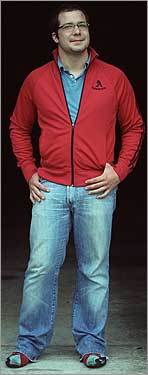
Trevor Wright (above) is an angry, very disturbed man who (in our opinion) should be kept away from kids. His Internet writings are filled with pure hate and venom against parents who want to protect their kids. For example, he refers to one mother as a "douche-bag".
|
Trevor Wright says he started looking at other boys when he was 6 or 7. "At first, I thought they were cool, but then I realized that I liked them," laughs Wright, a muscular UMass-Boston student with cropped dark hair and an easy smile who lives in the South End. Now 23 and a student of community planning, he attached the word "queer" to his feelings when he was 15. At 16, he came out only to a few friends at Weymouth High School. But in the way of small towns, a few friends told parents and Wright's mother soon learned her son was gay - not from him, but from a casual acquaintance in an arts and crafts store.
His parents were surprised, but they made it clear that his orientation did not affect their love for him. In his parental support, Wright is like many in the "next wave." (Jennings explains: "There's a new generation of parent whose first reaction is not 'What did I do wrong?' but 'What do I do to help my kid?'") Wright is also part of this next wave because he came out in high school, while living at home, rather than doing what many older gays and lesbians did: waiting until college to explore their sexuality in a town far, far away from their mother's haunts.
According to Ritch Savin-Williams, a professor of human development at Cornell University and the author of The New Gay Teenager, Wright's coming-out age of 16 is now the national average. In the 1970s, it was 21. Savin-Williams cites the visibility of gays in the media and in public life as an explanation for the five-year drop. Earlier generations knew they felt different, that they didn't have the attractions they thought they were supposed to have, but they often didn't know the word "gay" or know anyone in an open same-sex relationship. Students today put the language to their feelings at much younger ages.
|
Note: Each year they're bringing in younger and younger "recruits." We've noticed that, too.
|
At 23, Wright is one of the older attendees at BAGLY (and he now works for the group), but that wasn't always the case. He says that when he began going to the group's social events seven years ago, many more members were in their late teens or early 20s." Every year, it gets younger here," he says. He and I both glance at the slight, freckled boy who, we've just learned, is 13 and likes the color blue.
|
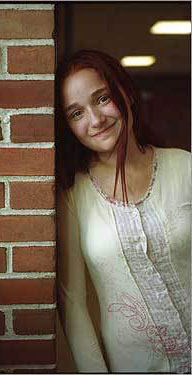
Globe photo of Kristi Freedman. Started questioning her sexuality at 6?? The "Gay-Straight Alliance" obviously did the rest.
Note: The principal of Newton South High School is an open homosexual "married" to his partner, (whom he brings with him on school trips). What a role model for the kids!
|
LIKE TREVOR WRIGHT, KRISTI FREEDMAN started questioning her sexuality when she was 6. Now 15 and living in Newton, Freedman remembers feeling intense admiration for certain girls and women, and when she reached late elementary school, she was aware of feeling left out when other girls began talking about boys. It was in middle school that she applied the term gay to her feelings. "I figured that this word - 'gay' - that's what I am," says Freedman, a soft-spoken sophomore at Newton South High School. She describes herself as having been a pensive preteen, "kind of a wallflower," and says she spent a lot of time just thinking about her possible identity, especially in middle school, before she discussed it with anybody. But during her freshman year at Newton South, she began going to Gay-Straight Alliance meetings at school, wrote an anonymous article about being gay for the school paper, and then told her parents soon after.
Freedman says the process was difficult, not because her parents didn't accept her - they did - but because, in declaring herself gay, she was essentially declaring herself a sexual being, and that was particularly hard to do in front of her father. "I kind of wanted him to see me as sort of young and innocent," she remembers. "Putting your orientation out there is giving up a little of that innocence; it's a step of growing up."
In identifying as homosexual at the same time that she identified as sexual, Freedman and other teens may be making the closet metaphor obsolete, says Savin-Williams. "The closet, so to speak, is really something that's far more characteristic of older men and women," he says. "Many kids today, they don't come out, because they were never in."
|
This is such dangerous insanity . . .
|
So students who first experience sexual attraction by being drawn to the same sex will no longer spend years or decades or even a lifetime pretending otherwise. When they acknowledge those feelings early - while still on the cusp of becoming physical adults - these teens can then take the same incremental steps into relationships that their straight peers do: noticing an attractive person, thinking about him or her, and maybe then holding hands. And that should be comforting to those adults who automatically link homosexuality, and discussions thereof, with sex. In the next wave, a teen who says "I'm gay" is probably no more (or less) likely to be sexually active than a girl who says "I like Bobby."
Cindy Telingator, a psychiatrist with the Cambridge Health Alliance who counsels LGBT youth, believes that acknowledging homosexual attraction at a young age makes for healthy personality development. "Not having to split off and hide a part of oneself," she says, is "very helpful for one's development and mental health." But she points out that kids who express same-sex interest at a young age will not necessarily grow up to form same-sex partnerships. Some will. Others will explore and then end up in heterosexual relationships. Telingator believes that, unlike gay adults, who typically kept their feelings private until they were certain of them, teens today are less fearful of peer and parental responses and therefore have "more permission to explore."
That means at least some of the gay teens who come out at a young age won't stay out. Or, to borrow a more apt metaphor from one Gay-Straight Alliance faculty adviser, today's teens are more casual about "trying on the gay hat to see if it fits." Some of them will decide the hat doesn't fit them after all.
|
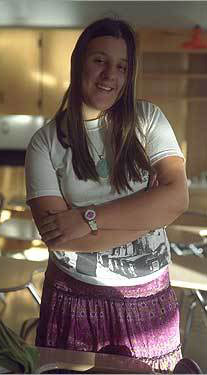
Boston Globe photo of Marta Sicinska. A VERY confused young lady -- another product of the homosexual movement in the schools.
|
EIGHTEEN-YEAR-OLD MARTA SICINSKA is one of the organizers of Newton South's Gay-Straight Alliance. A tall, olive-skinned girl, she's a relaxed presence at an alliance meeting after school one September Monday. As two dozen students - mostly girls - munch on brownies, chat, and blow off steam after a long day of classes, Sicinska quietly distributes markers to make publicity posters featuring the group's motto: "We Put the OUT in sOUTh!" A senior, Sicinska says she is straight now but used to think she was bisexual. She looks back on that brief period - during which she never dated a girl, just felt some attractions - as a phase. But she's also not convinced her straight identity will be with her forever and wonders why she needs to label herself at all. "I probably wouldn't engage in a relationship with a girl, at least right now, but things could always change," she says. "You're always meeting new people."
Many experts think women are much more likely than men to go back and forth between sexual identities, and that the line between a close friendship and a romantic relationship is often more blurred between women than between men. Some of these girls - and a few boys - consider themselves fully bisexual. Others prefer the terms "heteroflexible" or "polyamorous." Still others just say they are "questioning." And many experts believe that on issues of sexuality, all teens are, to some extent, questioning: They're becoming aware of their attractions and trying to determine how attraction translates into behavior and identity.
But teens whose feelings are more definitive say that when sexual identity is fluid and uncertain - when the gay hats keep going on and off - social life becomes that much more complicated. In a sign that many schools have successfully combated bullying, a number of gay teens say one of their biggest challenges is just finding boyfriends and girlfriends. "Some people make their orientation very ambiguous," sighs Freedman, the Newton South sophomore. "You see someone with a rainbow on their backpack, and you don't know if they're a supporter or actually LGBT."
"I think it probably gets easier as you get older," she adds hopefully.
|
"They want to know where they can meet boys!" says Peter Atlas, former gay club advisor (Boston Globe photo below). And he certainly helps them.
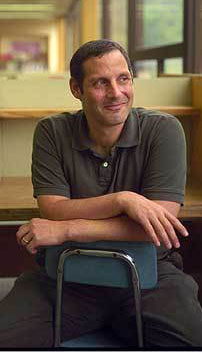
We begged the Romney administration to close down that depraved "commission". Here's what we showed his staff. But they backed down and wouldn't do it.
|
Russell Peck is finding life in New York much easier than in Concord, not because Concord was actively hostile, but because there were hardly any other openly gay boys around. The desire to have all of the semi-public romantic agonies and ecstasies that their straight peers have makes events like BAGLY's prom popular. Several students I interviewed had their first kisses at BAGLY or their first same-sex relationships through their school's Gay-Straight Alliance. And Peter Atlas, the former adviser of Concord-Carlisle's Spectrum group, says that, increasingly, gay kids who turn up at his classroom aren't only asking questions about coming out and getting support. "They want to know where they can meet boys!" he says with a laugh.
AS LIFE FOR THE NEXT WAVE OF GAY AND lesbian students becomes more like that of their straight peers, the next wave of activists are focused on a different group: kids whose gender is ambiguous and/or whose sexuality doesn't fit either the "gay" or "lesbian" category. BAGLY recently added the words "transgender" and "bisexual" to its name. The state's commission on gay and lesbian youth tried to add the same two words to its title but was not permitted to under Mitt Romney's administration - which, in 2006, came close to revoking the commission entirely.
Meredith Nicholson, an 18-year-old student at Brookline High School who is active in the school's Gay-Straight Alliance, says one of her goals for her senior year is to amend the school's anti-harassment policy to add gender identity and expression. She says that while she believes students are rarely harassed based on sexual orientation itself, boys with feminine traits - and girls with masculine ones - still have a tough time." People often ignore trans-youth and their needs," says Nicholson.
|
Transgenderism -- the next plateau of homosexual activism in the public schoools. They're already starting the propaganda machine around that, claiming "abuse" etc.
|
Indeed, the sole transgender student I met reporting this article described a brutal high school career. As he spoke about harassment, physical abuse, dropping out of school, and attempted suicide, the student, who identifies as male but began high school female, sounded very similar to the gay and lesbian teens who rallied at the State House in the early 1990s for a law to protect them. Now, 14 years later, gay and lesbian teens are increasingly mixing with mainstream high school culture - and helping to define it.
|
|
Last year, when Spectrum students at Concord-Carlisle wanted to raise money, they organized a bake sale. They took the recipe for Rice Krispies treats but used a substitute cereal: Fruit Loops. Then they marketed these marshmallow confections as "Fruity Gay Bars" and joked that the treats could make you gay. Straight kids lined up to buy them anyway.
Alison Lobron, a freelance writer in Cambridge, is a frequent contributor to the Globe Magazine. Send comments to magazine@globe.com.
|
---------------------------------------------------
NOTE: In accordance with Title 17 U.S.C. section 107,
this material is reproduced for non-profit educational
purposes only. For more information go to:
http://www.law.cornell.edu/uscode/17/107.shtml
---------------------------------------------------
|







Our comments:
This is what your public schools are doing to children, using your tax money.